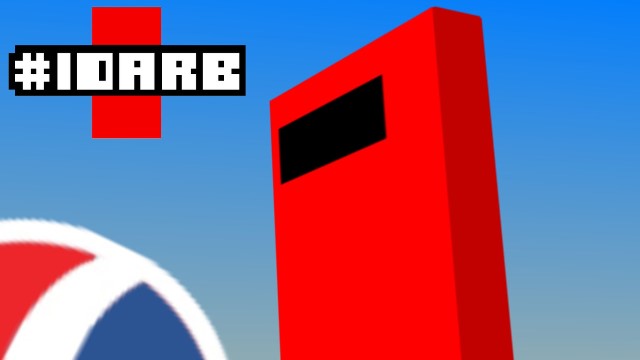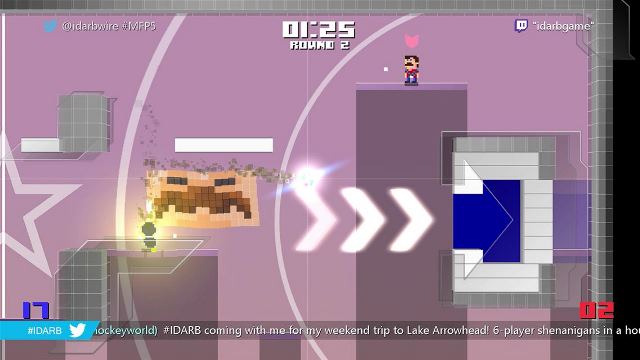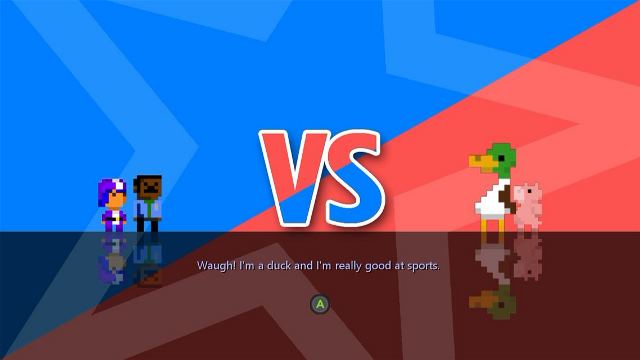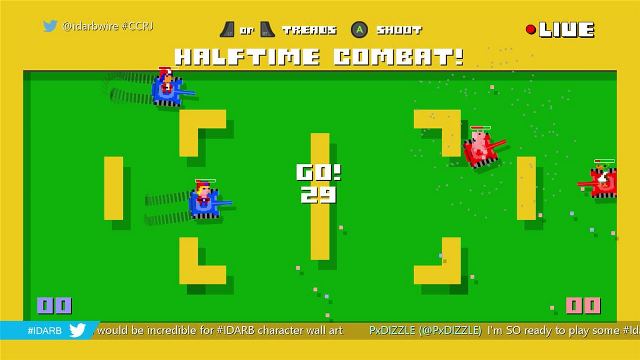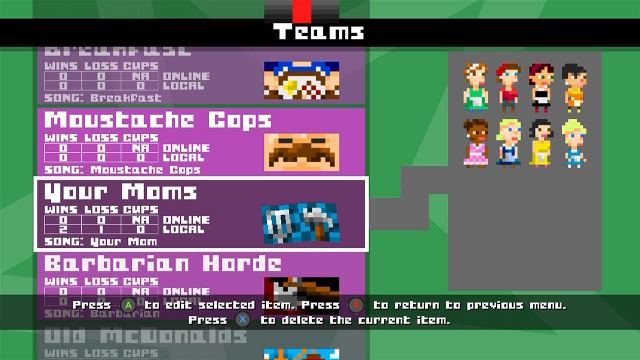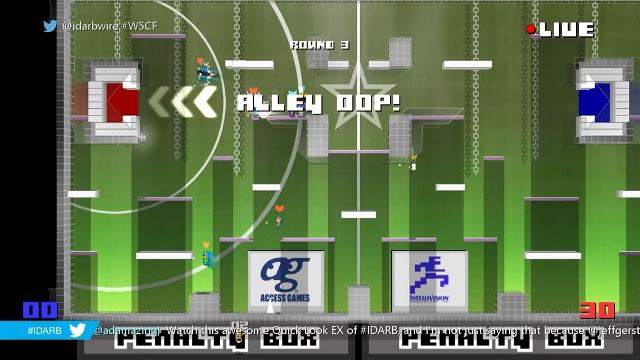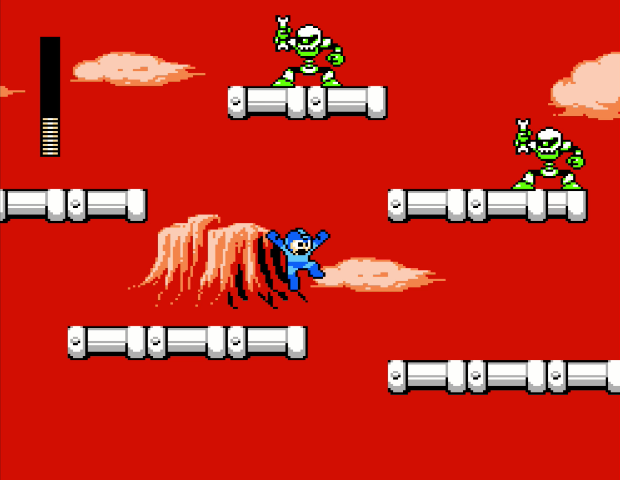Mike Mika has a problem. Gamers who’ve secured free copies of #IDARB, his multiplayer hybrid basketball/platformer game, likely don’t consider it to be a problem, but for Mika and his team at developer Other Ocean Interactive, it absolutely is. And it’s one that the head of development at Other Ocean can’t help but exacerbate.
“The problem we have, everything is so…we’re just so fixed in our ways,” the design director tells XBLA Fans, “it’s like, ‘Well, this should just be free. It should just be free.’ And we’re probably part of the problem when you hear people complain about free-to-play games, and how that’s been a race to the bottom on being able to make money. I can see how that happens, because while we’re putting this game together it feels like the right thing to do by all the gamers is to give [#IDARB] to them. I’m sure it’s dangerous. We can’t afford to keep giving it to them.”
But he wishes that they could. While acknowledging that giving too much away is “dangerous,” Mika says that his studio is “definitely erring on the side of being as extremely fair as possible.” No one who’s followed #IDARB (It Draws a Red Box) would dispute that that’s exactly what Other Ocean has done with its game. Mika solicited the help of every gamer with an opinion when designing #IDARB. Then he gave his game away for free before it released. Then he again gave it away for free when it released. Now he wants to give some additional #IDARB content away for free — all of its additional content, actually. But he can’t do that; he’s got a family to feed, and a studio to make profitable. So how does Mika do that? Where does he draw the line between what’s free and what’s for sale? He’s not really sure.
All you have to do is ask
#IDARB was part of Microsoft’s Games With Gold program in February, when it released. Except that wasn’t when it first released. Not really, anyway. If you wanted it as far back as December 2014, all you had to do was ask, and there was a pretty good chance you’d receive a copy. Mika, apparently not content to wait around until Microsoft gave his game away for free, started giving away copies himself last holiday season to virtually any Twitter user who asked for one. In fact, his giveaways were so prolific that they made Mika feel like he had “just started playing Santa Claus.”
To understand why he took this unusual step, you must first understand #IDARB’s development history, its crowdsourced gameplay ideas and the promises Other Ocean made to the crowd that had those ideas.
Development famously started in January of 2014. It was then that Mika tweeted a picture of the eponymous red box and wrote “Where to go with this? I’ve started a new project, it draws a red box. Thinking platformer. #helpmedev.” Legendary game developer Tim Schafer of Double Fine fame responded by saying that the box should be forced to make a critical choice from which a narrative would branch out. The narrative may not have branched out, but the game’s development certainly did.
Ideas began flooding in — some sublimely ridiculous, others just ridiculous. Mika heard every idea from “hacking” different colored boxes into the game to playable breakfast foods, from Twitter commands known as “hashbombs” that change the rules mid-match to turning #IDARB into a tank combat game. Astoundingly, all of those concepts made their way into the final design.
“You know what, I had no idea what I was going to do with this game, actually, most of the time,” says a laughing, earnest Mika. “Because it’s something I felt was very community-driven. All my friends on Twitter and everything like that were contributing so much to it in a way that was shaping what it was. And working with Microsoft has been pretty amazing, because they understood it probably better than I did pretty early.
“I was often talking with Chris Charla, head of the ID@Xbox program, and he would tell me these things — things that he thought would be good for the game. And he was very objective about it, and I was like, ‘Well, why would anyone care about that in this game?’ Because in my mind this was still a prototype or something that was very throwaway. And by the time E3 came around, and we saw the sort of attention that the game was getting at E3, it finally settled into me that we had something that was worthwhile, had something that people could really want to play.”
In people we trust
Other Ocean has historically been known for porting other studios’ works over to different consoles. Mika wanted a break from working on others’ ideas. In January, he told Retro Magazine that he wanted to regain creative control over something, and that he wanted to start coding again. He accomplished the last part in short order, coding his red box. At which point he proceeded to do a complete 180 on the creative front; he asked those whom the game’s credits lovingly refer to as “The People of the Internet” to take the reins.
“You know, it was a situation where I had been making a lot of games for a long time for other people. It usually starts off with you feeling like you have a lot of creative control, and you have a bunch of ideas, and everybody really likes them. And as you start going into the project, more people come on board, and the stakes are usually a little bit higher. And the next thing you know it feels like it’s being ripped from your creative hands to feel like now being more part of a consortium, or, you know, it’s like a too many cooks in the kitchen sort of situation.”
Actually, it wasn’t a succulent entree that Mika thought he and the aforementioned people were making. It was what comes after you’ve eaten the entree — “a steaming pile of ****.” Nearly a year ago, that’s what Mika told Gamasutra he initially thought his game would turn out to be. It didn’t, though. To the surprise of even Mika himself, making a collective of Twitter users #IDARB’s creative directors has resulted in a surprisingly clever and addicting multiplayer game. There was at least one man who never doubted that would happen.
“I know what an amazing mechanic designer Mike is,” says Chris Charla, “so I was super enthused right from the start, watching him and [Other Ocean Designer] Frank Cifaldi, and Tim Schafer and other people trading ideas back and forth about the game. You’d have to ask Mike, but I may have been the first person to actually use the #IDARB hashtag.”
He wasn’t. Mika attributes the hashtag to another Twitter contributor. However, it’s clear that Charla was on board with the game from the outset. In fact, it was Charla who named the game It Draws a Red Box and nicknamed it IDARB.
It’s not horrible… but it doesn’t fit
The ID@Xbox director claims he was never concerned that Twitter was directing #IDARB. He likens its creative process to that of improvisational acting. “People who go to improv shows are rarely as funny as the people on stage, but they shout out ideas, and the improv team makes it work,” Charla explains. “You can tell Mike the strangest idea, and he’ll figure out a way to implement it and make it fun. Of course, if he doesn’t like it, you kind of know it. I kept begging him for a double jump and #IDARB got one, but it’s a pretty nerfed double jump. And he knew I wanted it to make up for my lack of skill, so of course it ends up being this total finesse move that really can only be used well when you’re pretty good at the game and playing at a high level.”
The reason he consulted with the People of the Internet was that Mika missed the way he used to develop games: asking his friends to play works in progress and generate ideas for them. His friends from his younger days are today spread around the world, so he turned to Twitter. “I thought it was kind of fun at first where it was, ‘Oh, let’s try to put them all in. See what happens.’ The real fun started to begin when I’d get these crazy ideas and thought this was kind of a fun challenge. I could take this kind of really crazy or obtuse idea and just try to make it work in the game.”
As you might expect, however, Charla’s double jump wasn’t the only “crazy” idea Mika wasn’t totally smitten with. By June of 2014 he realized it was time to hone in on what #IDARB actually was. It was a multiplayer platformer in which players tried to score points with a ball. If ideas were bad or if they didn’t jive with the core concept, they had to either be abandoned or tweaked until they fit.
Some gamers suggested hashbombs that gave one team unfair advantages over the other, such as shrinking the size of their opponents’ goal. Other Ocean adjusted that particular idea to shrink the size of both teams’ goals. Mika states that he’s received a multitude of other hashbomb proposals that would have compromised the integrity of the game’s competition, and he hopes he’ll eventually find the time to circle back to and re-balance them.
You wouldn’t think Other Ocean would be able to balance, say, that tank combat idea from earlier in its sports-style game. But Mika’s team had a solution for ideas like that too. “We had this idea of doing mini-games during halftime,” he explains. “So, the combat game with tanks was just somebody’s idea of just, ‘Uh, I don’t know about this sports game, but I’d love it if it was a tank game with combat.’ And so we put those ideas where we could into the halftime event.”
Free today, gone tomorrow
Other Ocean had been juggling a plethora of seemingly incongruous items from the start. And every time Mika thought he had a good handle on them, someone would slip a lit torch into the mix. Still, the plan called for a release in September. And then in October. And then in December. The Studio couldn’t meet any of those goals, but what it did do was pull off a sort of soft launch over the holidays. Mika had promised the People of the Internet a 2014 release, and failing to deliver it was not an option to him. Microsoft offered the solution he needed.
#IDARB development had wrapped by December, but not soon enough to be included as part of that month’s Games With Gold program, which would have required a December 1 release. The two sides decided to wait and release it as part of February’s Games With Gold promotion. But Microsoft also approached Mika and told him it would provide however many game tokens he needed to give out in late December. “And it kind of clicked in my head. ‘Well, I can at least get these games out to people who’ve been waiting for it.’”
Mika, gaming’s own Jolly Ol’ St. Nick, started sliding toys under the Twitter tree about a month and a half before #IDARB’s release. “It was a little scary, because it was the moment of truth,” he recalls, “and it was going to get out there, and my main thought was everyone would be like, ‘This plays like crap.’
“But people started playing it, and they really liked it, and that was fun. And that fueled more and more people wanting the game. And so more and more people kept lining up wanting more codes, and that sort of thing. So we got creative with how we got codes distributed. And I remember the whole holiday was pretty much me sitting in front of my computer trying to keep the codes coming and get them out to people.”
Though Mika found it difficult to keep track of everyone who had contributed ideas to his game, he did his best to distribute #IDARB codes to the contributors first. That’s when the streaming began. As gamers watched an increasing number of individuals streaming this fun, new indie game, they wondered how they too could play it. The game’s launch was still over a month away, but Microsoft had passed along an abundance of free copies for Other Ocean to give out. The requests came in, and the codes went out.
Mika recalls it feeling like an avalanche had hit. “We couldn’t keep up!” he exclaims, laughing. “Random gamers got copies. Reviewers like XBLA Fans got copies and, without an embargo to stop them, published early January reviews for a February release. The verdict was in: the only thing #IDARB was a steaming pile of, was awesome.
The party didn’t end when Other Ocean ran out of codes, either; Microsoft simply gave it more. To outsiders it looked a bit odd that the console holder was helping Other Ocean scoop its own Games With Gold promotion. But Charla doesn’t see it that way.
“Anything that’s good for developers and players is good for Microsoft,” he says. “Any time we can put a smile on someone’s face when they think of their Xbox One, we kind of win, is our opinion. In this case we knew the game would be free to Gold players, and Other Ocean approached us about doing an extended preview, and they had a lot of fans who really wanted to play the game over the holiday break, so it seemed like it made sense to everyone.”
I’ll gladly give you a few cents on Tuesday for a video game today
Charla concedes that the unusual move was “a little bit of an experiment, for sure.” He adds that Microsoft is open to exploring unconventional ideas with indie developers. The hope with #IDARB’s release strategy was that it would build advance hype. But now that the early giveaways and the launch giveaways are over with, how is Other Ocean going to make money off the game? Mika’s still not entirely sure, but he knows he can’t keep giving everything away for free forever.
Echoing Charla’s words, Mika admits that “It’s kind of the grand experiment for us, because we don’t really know. I would hope so. One thing that we are trying to figure out what to do with internally to help make this actually make some money versus being kind of a charity is to kind of extend the game beyond its launch. So after Games With Gold is done, the game’s going to be $14.99. That will help. At that point so many people will have it anyways it’s not going to be a good way to make money. In the long run maybe, but not in the short term.”
In 2015, gamers are used to the idea of getting high-quality games for free and then being asked to support them through microtransactions and/or DLC. It’s a bit of a contentious pricing strategy, but it appears to be one that’s here to stay. For his part, Mika doesn’t seem the type to push the kinds of predatory microtransactions that have ruffled gamers’ feathers in recent years. Yes, there will be more hashbombs, skins, abilities, tool sets for customizing arenas and other content added to #IDARB, but much of it will remain free.
Other Ocean is still asking internal questions about what justifies a paid DLC pack and what should just be given away. It’s important to Mika that gamers know that content is coming in one form or another, though. Last month’s #IDARB release was only the first version of the game.
“We’re going to keep updating it as often as we can, and we’re going to be going to other platforms. We’re going to be going to PC, of course. And we’re looking at other places to go with the game. I would love to have ideas continue to come in. So as people play the game finally, it will be awesome to hear what they think about it and what will be in the updates.”
Mika thinks gamers will appreciate the additional content to come, even if they have to pay “like a few cents or something” to get it. Of course, there will be the promised free content to entice gamers to purchase the premium stuff. After all, Mika can’t help but give stuff away.

